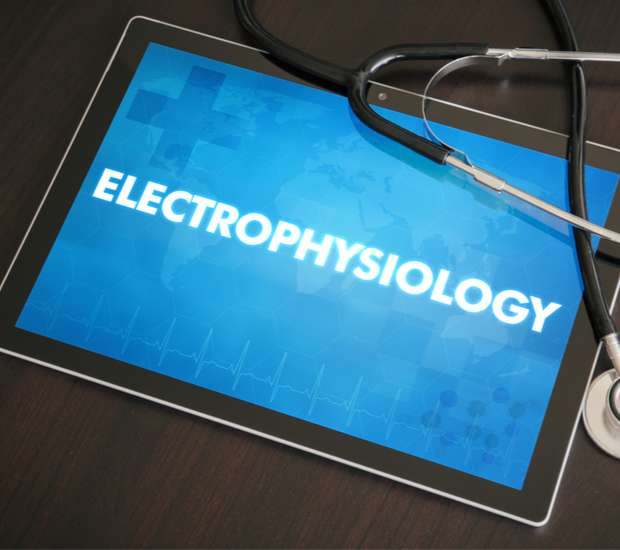ElectrophysiologyBronx, NY
The heart pumps blood throughout the entire body for a lifetime. When the heartbeat is irregular, a person does not get proper circulation. Fortunately, we can help with a variety of possible treatment methods, including electrophysiology. Electrophysiology studies are tests that help the doctor understand why a heart beats abnormally before using the results to find an effective treatment.
Electrophysiology studies are available at KezMed Medical PC in Bronx and the surrounding area. They may be performed to test for arrhythmia or irregular heartbeats, among other issues. The results of the study can help a doctor decide whether medication is needed to keep the heartbeat regular or if another treatment is necessary.
Call us at 646-216-1270 to make an appointment to discuss an electrophysiology study.
How Electrophysiology Works
The American Heart Association explains that during an electrophysiology study, the doctors insert a small, thin catheter into the blood vessel that goes to the heart. The device will then send electrical signals to the heart through the catheter while we record the heart’s activity.
We can then see why the heart is beating irregularly. During the study, the doctor can alter the heartbeat to different speeds to test different treatment options. We can complete this procedure at our practice. On the day of the procedure, an IV is inserted into the patient during the study.
We may use medication to help the patient relax and to assist with diagnosis. We may also administer oxygen during the procedure, along with cleaning the area of the catheter to ensure sanitary conditions. Common sites include the groin, arm or neck.
Understanding the Procedure
The doctor may use a local anesthetic, delivered by a shot, to numb the area where the catheter is. We will then guide the catheter to the heart. There may be pressure during the insertion, but the procedure should not be painful. During the study, when the heart beats faster or slower, let the doctor or nurse know if any symptoms are evident.
Once the study is complete, the patient will need bed rest before getting up. Patients should plan to have someone drive them home. Resting for a day at home may be necessary before resuming normal activities. The doctor may require a follow-up appointment to discuss the results and further treatment.
It is normal to have a small bruise at the insertion site or the IV site. The doctor will provide information about what to watch for after the procedure.
Benefits of Electrophysiology
An electrophysiology test provides doctors with detailed information about heart rhythm that can lead to possible solutions. During the study, if an area of cardiac tissue is causing an arrhythmia, the doctor can perform an ablation to destroy the tissue. The study can show if a pacemaker or defibrillator is required.
We can also find out if a medication can effectively treat the problem. Having a regular heartbeat reduces the risk of a future cardiac problem.
Call Us Today
Electrophysiology studies provide vital information when a patient has an irregular heartbeat. Our practitioners can discuss the procedure with you when you are dealing with arrhythmia or related issues. Call KezMed Medical PC at 646-216-1270 to schedule an appointment in Bronx to learn more.
Frequently Asked Questions
How long will the electrophysiology study take?
Usually, an EP study takes from two to four hours. If the doctor performs additional treatments, it could take longer. You should plan to rest following the procedure before you are released to go home. Most patients spend the day at the hospital.
Does an electrophysiology study hurt?
The EP study should not hurt. Some patients do experience discomfort as the heartbeat is sped up or slowed down. If you experience any pain during the procedure, please notify us. We will help to ensure you do not feel any pain.
What type of doctor performs an electrophysiology study?
A cardiologist or cardiac electrophysiologist typically performs an EP study. Cardiac EPs are cardiologists who have more training to treat heart issues. The facility may have other healthcare providers that assist with the research.
Are there risks with an electrophysiology study?
During the procedure, arrhythmia could make the patient experience dizziness. Sometimes blood clots form at the tip of the catheter during an electrophysiology study. Another risk is infection where the catheter is inserted. Discuss the risks with the healthcare provider to determine if the benefits of an EP study outweigh the risks.
Are patients sedated during an electrophysiology study?
During the procedure, the doctor may use sedation with local anesthesia, where the patient is awake but pain-free. General anesthesia, where the patient is asleep, may also be used. It often depends on the individual case.


![Harmful Lifestyle Habits For Your Heart [Ask A Cardiologist]](../../wp-content/uploads/Cardiologist-220.jpg)



